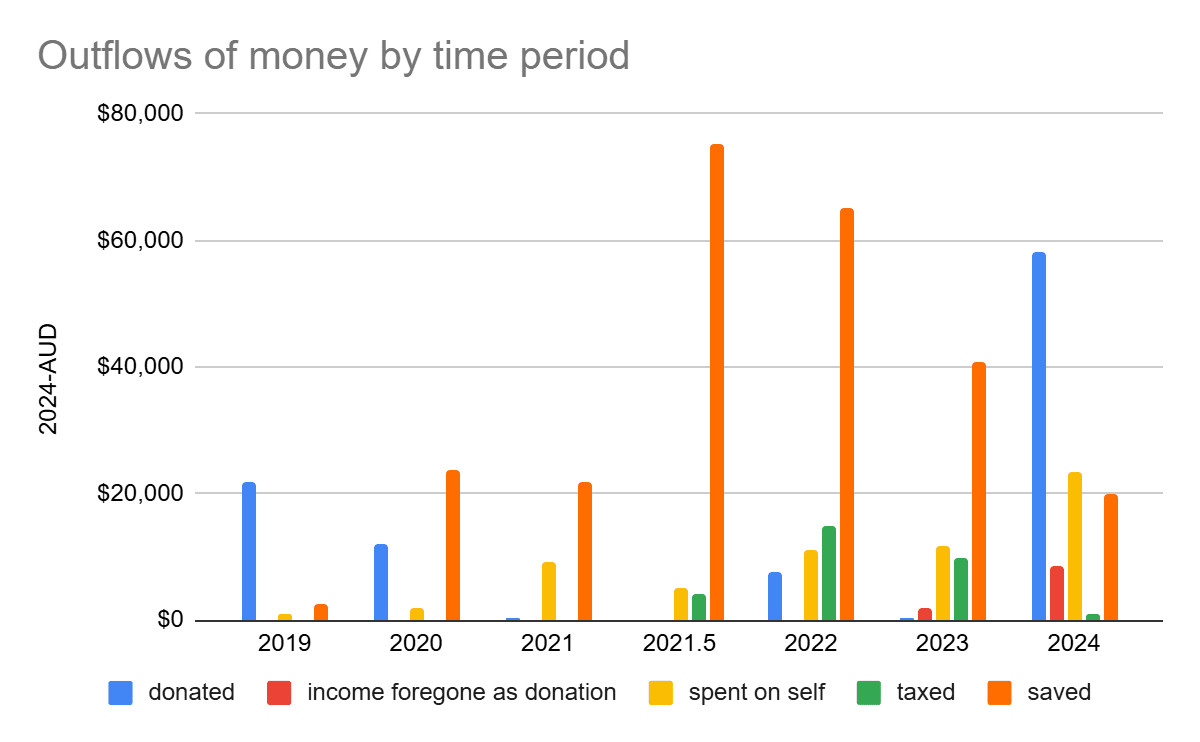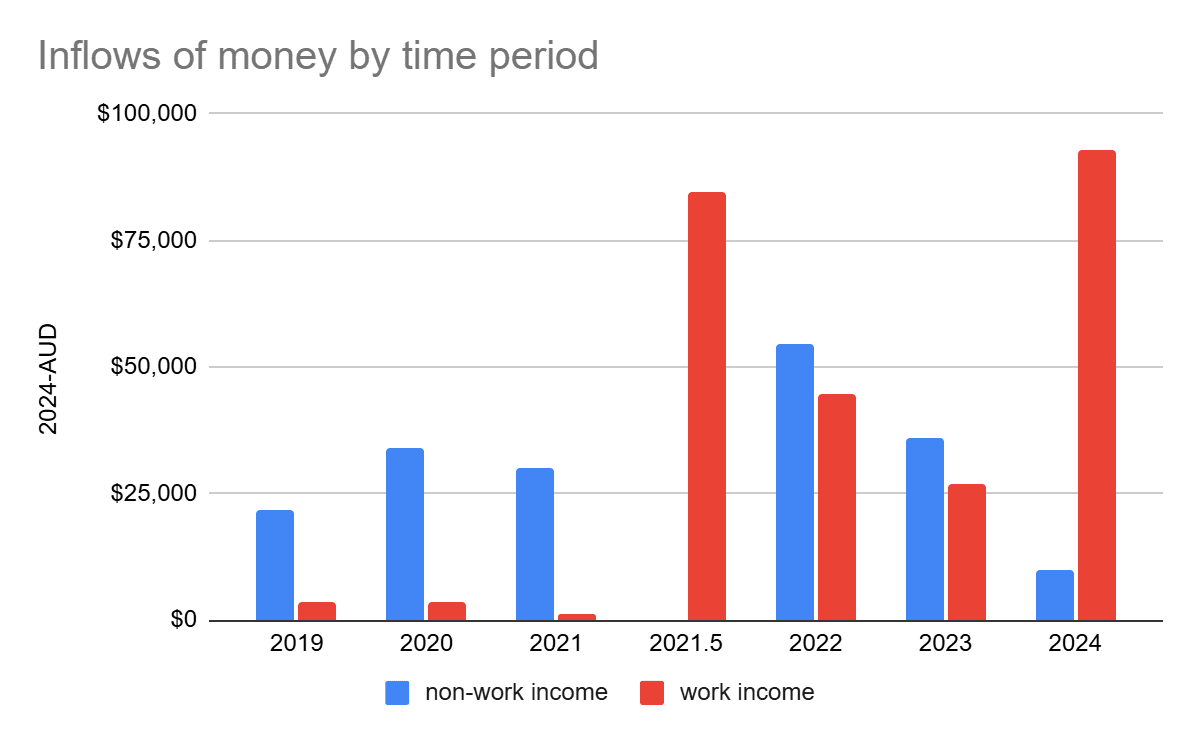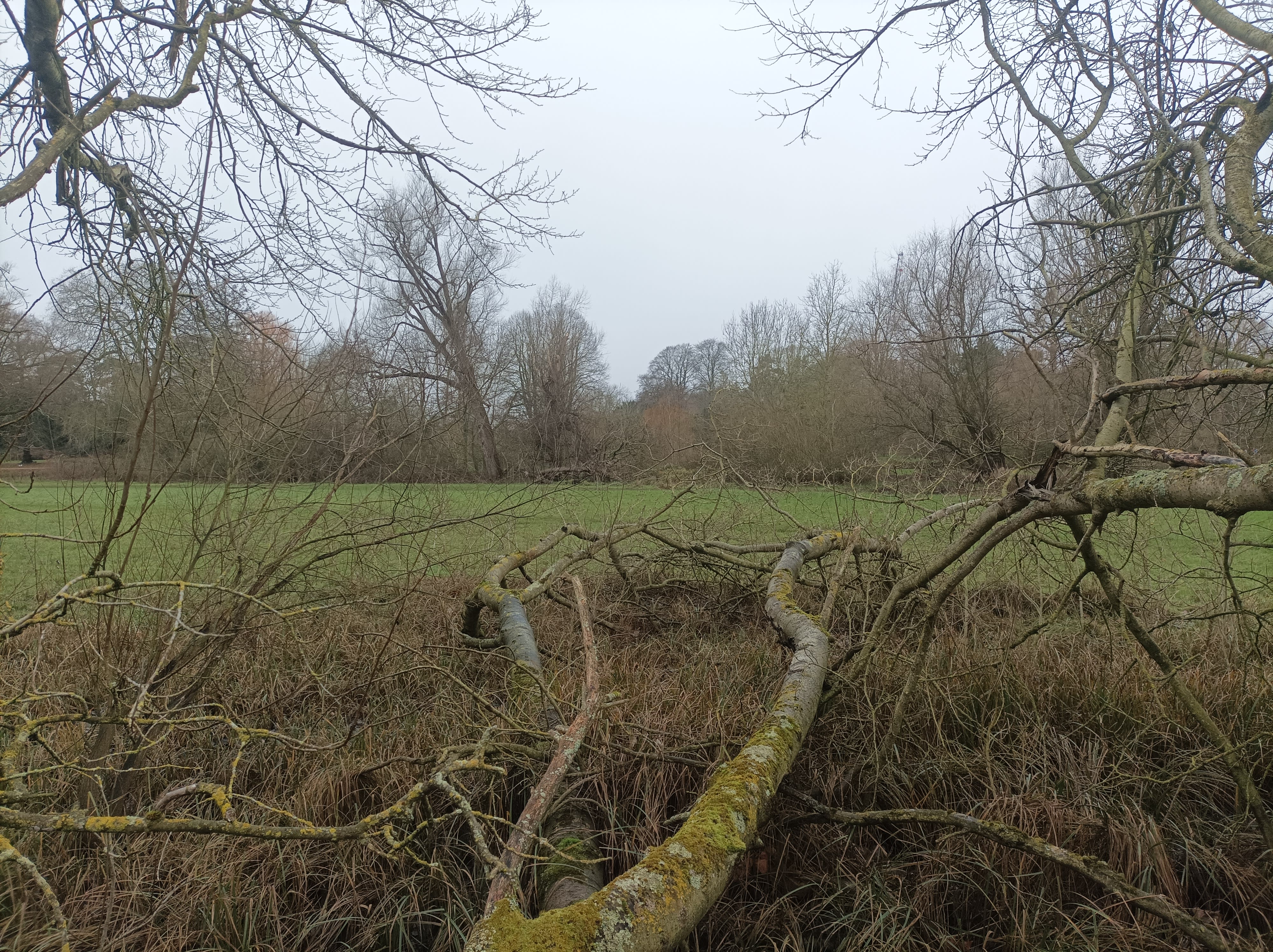Yesterday I donated my 100,000th lifetime dollar.[1] A few weeks ago was the fifth anniversary of my GWWC pledge. And this is Donation Celebration Week. So high time to step back and reflect on giving.
First a poem[2] (audio here). Then some facts, figures and reflections.
Poem
What should I do with all this money?
Serious stuff, not so funny.
Fancy luxuries, shiny and new,
To that I say: pooh-pooh.
A badminton racquet, a winter jacket.
A climbing shoe, a trip or two.
But that doesn’t count, I protest!
I can’t work all day, we all need a rest.
My younger self, to GiveWell donated.
But now that’s passé, antiquated!
Swamped by phylum Arthropoda,
Digital minds, or even odder.
What about patient philanthropy?
If AI automates all industry,
Returns could be massive,
With investments passive.
But money in a century,
Won’t matter if all things are free.
Even less if we’re all dead,
“The lightcone’s ours,” the AIs said.
So to the Longterm Future Fund
(let’s make extinction moribund)
I entrust this stack of cash.
I thought it through, it wasn’t rash.
The ghost of a child I could have saved,
Says to me: “You’re depraved.
We’re dying now, by the droves,
For want of vaccines, clean cookstoves.”
I didn’t kill you, don’t blame me.
Your plight is plain for all to see.
I don’t know how they could let
You all die, sans bed net.
But “they” is me, and I am they.
You’re dead. I mustn’t look away.
Is my fancy philosophy,
More than just sophistry?
And to all you shrimps and fishes,
Sorry to deny your wishes.
When our cruelty finishes,
You’ll be in our hearts, not our dishes.Prose
I have not previously been very public about donations because it feels strange to talk about and not all that informative (here I am, yet another of many EAs donating to the same few causes). But inspired by e.g. Jeff and Julia, Peter Singer, and Richard Chappel I am more persuaded talking publicly about donations is a healthy norm to promote. So here it goes.
Timeline
- 2018: I learn about EA via reading Famine, Affluence and Morality. I graduate from high school.
- 2019: I start earning money from my university scholarship, and donate most of it to GiveWell.
- I believed GiveWell’s numbers and Singer’s arguments and wanted to save the most (human) lives I could. I thought spending much money on myself was impermissible.
- 2020: I become a bit more savvy and learn about tax-efficient giving, so donate to AMF (one of the few tax-deductible GHD charities in Australia).
- The Australian government does plenty of good things, but I thought my money would be better spent on bednets.
- 2021-22: I become far richer, but make few donations.
- I still planned to donate most of my money, but I was not on the ball and missed the financial year deadline. I rued my mistake and resolved to do better.
- 2023: I don’t have much taxable income this year, and don’t prioritise looking into donation opportunities.
- I’m not too sure what I was thinking actually, I think I was just busy and confused about where to donate so didn’t get around to it and ended up needing to pay a bit of tax anyway.
- 2024: I finish university, start working full-time, and get on top of managing my finances.
- I donated to Effective Altruism Australia while I was an Australian tax resident, as I am mainly interested in longtermist charities but there aren’t many tax-deductible options.
- Then I moved to the UK, opening up a panoply of tax-efficient giving options. I chose LTFF as a relatively ‘safe’ option since I didn’t think of any better ideas, and donated enough to use up ~all my gift aid and hence effectively not pay tax.
Here are my money in- and out-flows over the years broken down by category.[3]
My biggest lifetime sources of money (>10k 2024-AUD) have been:
- Rethink Priorities (91k)
- Jane Street (85k)
- University scholarships and prizes[4] (82k)
- Inheritance (48k)
- Youth allowance from the Australian govt (38k)
- MATS (26k)
- CERI/ERA (25k)
- Volunteering in medical trials[5] (12k)
- Australian govt internship (10k)
Details are in the accompanying sheet.
I think it is somewhat atypical to reveal such details; I do this partially for transparency,[6] and to not falsely inflate the impressiveness of my donations. As you can see I received lots of this money (youth allowance, inheritance, scholarship) without needing to work for it, just by virtue of my nationality, family, and test-taking ability, and much of the rest (Jane Street) in a rather unfair economic system that ludicrously rewards specific mathematical skills. I think most of this money coming to me somewhat unbidden and undeserved made me more keen to donate it. But now that I am somewhat more properly ‘earning’ money I plan to keep donating.
Reflections
- I find it hard to remember why I decided to donate in the amounts and to the places that I did. For instance, I think I knew about animal welfare as a cause area and was already vegetarian in 2019, but I don’t think I seriously considered donating anywhere other than GiveWell. I have now started noting down my reasoning about major donation decisions so my future self can keep track.
- I think I worry less about value drift now than I used to. When I was considering whether to accept my quant trading internship offer, I was scared I would get lost in a fancy world of super-rich people and lose perspective. But that didn’t happen, and now I feel so embedded in a community of people who take ethics and donations seriously (EA people, but also my family and some other friends) that I am not too worried about completely losing the plot.
- I take moral mistakes more seriously, and am worried I am missing crucial considerations and not reasoning about the timing, sizing, and recipient of donations properly. I still think GiveWell is amazing, but my beliefs and values, and therefore donation decisions, have changed a lot in the last five years.
- So these two factors combined (drift = unlikely, new information/values = more likely) make me less inclined to rush money out the door. My plan is to just donate the minimum each year to avail of tax advantages, and otherwise wait until there is an extra-good opportunity to upsize my donations, or I feel more settled and confident in my moral worldview.
- I’m not too sure what to make of donation-splitting. So far each time I made a donation it has been to just one place that I thought was best, but over time that has meant some amount of diversification. I can imagine doing more donation-splitting in the future if I become more persuaded by some sort of risk-aversion/non-maximizing argument.
- As expressed in my poem, I do feel the opportunity cost of donations I could be making but am not. In a sense, this makes me glad to have already made more conventional global health and development donations earlier in life to get some more concrete wins under my belt.
Appendix: What about AGI??
I was pretty shocked by o3.[7] I was already working in AI safety and planning to donate to AI causes, but this made AGI feel viscerally far closer. AGI coming this decade (~40% credence) should have pretty significant implications in many life areas:
- Donations: if anything this makes me think front-loading donations is better, given the risk that I wait too long and we pass a point of no return after which donations become a lot less useful. So I intend to be more on the lookout for great time-sensitive opportunities, but didn’t think of anything better than LTFF at the moment.
Investments: this post isn’t the place to do a deep dive, but I started thinking more about how to make money off of AGI. Ultimately I decided to stay in regular index funds for now, but will be more open to riskier investment strategies going forward if they don’t require too much effort.[8]
- Personal: Ben Todd’s suggestion to not have a child in the next few years while we wait and see whether there will be an AI winter or we get to AGI made sense to me. I wasn’t planning to have a kid in the next few years anyway, but this is another reason not to.
- ^
Inflation-adjusted 2024 Australian dollars. Details here and below in this post.
- ^
This was the view from where I wrote the poem, sitting in a tree after the special Christmas parkrun in University Parks in Oxford. After a while my wet feet got cold and I went inside.
- ^
2021.5 represents Nov 2021 - Feb 2022 when I was raking in the big bucks as a quant trader in Hong Kong, so is structurally somewhat distinct from the rest of my financial life.
In most of these years there were a bunch of things I got for free - living with my parents rent-free for the first few years, and this year working for free at Trajan House in Oxford.
- ^
I separately have ~40k of university HECS debt from deferring paying all my fees, but this is interest-free (indexed to inflation) so seems best not to pay off and keep as free leverage.
- ^
One of them is ongoing: I am one challenge out of three done in this malaria challenge study.
- ^
Earlier this year I agreed with my family and a few friends to annually send them a snapshot of my finances for accountability, and this year I am making a partial version of that public.
- ^
Just a few weeks before I had forecasted a median 8% maximum score for an AI system on FrontierMath by EOY2025, only to have o3 obliterate that a year early with a 25% score. I think that benchmark is salient to me given I think of myself as pretty good at solving competition maths problems, but couldn’t even begin to make headway on the sample questions I looked at.
- ^
One thing I thought of that I haven’t seen discussed much is that presumably land and raw materials will retain significant value in a post-superintelligence world. (This is because the human knowledge economy will be obsoleted by AIs, but AIs can’t cheaply create new land, until large-scale space settlement is achieved.) Currently, parts of the world, notably the Australian desert, are very cheap (~$1,000 per square kilometre). But buying land directly is a big hassle, and buying shares of e.g. mining and agriculture companies with large land holdings gets lots of other exposure I don’t necessarily want, e.g. to the beef industry. Still I have noted in my calendar to look into this further once a year, or more regularly if things start moving faster.




Thanks for sharing.
I really appreciated that you shared the sources of the money and the tidbit about how much of it came to you without needing to work for it and somewhat unbidden or underserved. As a reader, I appreciate seeing that level of self-awareness or reflection.[1]
Also, cute/fun poem! That brought a smile to my face.
As opposed to reading that someone donated large amount of money within a year or two of starting working, which would make me wonder "how the heck did they get all this money?"
Thanks for writing Oscar
You mentioned looking for longtermist donation opportunities. One thing that might help is the Nonlinear Network, where donors can see a wide variety of AI safety donation opportunities, and also see expert reviewers ratings and comments. You can also see other donors' opinions and voting on various donation opportunities. This allows you to avoid the unilateralist curse and use elite common sense.